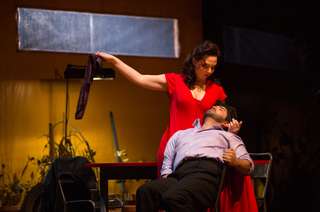|
Back
Opera at CanStage Toronto
The Bluma Appel Theatre
11/17/2015 - & November 20, 21, 22, 25, 26, 28, 29, 2015
Philippe Boesmans: Julie
Lucia Cervoni (Julie), Clarence Frazer (Jean), Sharleen Joynt (Christine)
Chamber orchestra, Leslie Dala (conductor)
Matthew Jocelyn (director), Alain Lagarde (set designer), Zaia Koscianski (costume designer), Michael Walton (lighting designer)

L. Cervoni & C. Frazer (© Cylla von Tiedemann)
The Belgian composer Philippe Boesmans has composed six operas starting in 1983 and this production of Julie (2005), a treatment of August Strindberg’s play Miss Julie (1888), is the first time a work of his has been staged in North America. An unusual circumstance is that the opera is being presented as part of the season of the Canadian Stage Company (in conjunction with the ever venturesome Soundstreams). The company’s current director, Matthew Jocelyn, has been broadening the theatre company’s presentations to include dance and musicals as well as the more familiar scripted plays, and this is their first opera.
The three-character drama features an entitled young aristocrat (Miss Julie) and her desperate fling with a worldly manservant (Jean) who is engaged to the cook, Christine. The power game between Jean and Julie has a tragic outcome. The psychological struggle is the crucial element of the drama and the 75-minute length of the opera fails to give time for the dramatic arc to unfold. As a result, the ending comes not quite out of nowhere, but close to it. (The play is a difficult work to stage convincingly as well.)
Not long after the premiere of Julie, Matthew Jocelyn (then working in France) mounted a production for the Théâtre d’Orléans that then toured extensively. This production uses the set from Orléans. It features (as required) the kitchen of a manor house, and this one has running water plus a gas flame - very naturalistic. The time frame of the action is during the shortest night of the year but the dark set fails to conjure up those magical twilight hours, although the brief rain squall is nicely portrayed.
Philippe Boesmans (b. 1936) came of age in the 1950s and one of his noted teachers was Henri Pousseur, a member of the “Darmstadt School” of composers, so-named because of their adherence to an influential approach to composing advocated at a summer school held in Darmstadt, Germany, beginning in 1946. The idea behind Darmstadt was to shake off the strictures imposed by fascist cultural policies which is exactly what happened with the adoption of mathematics-based serialism inspired by Anton Webern. A kind of groupthink backed by relentless proselytizing took hold and what had been repressed became obligatory for anyone seeking to explore new directions in music. The practitioners deliberately sought to please only a small coterie (as opposed to a broad audience), and this they did. The resulting music eschews melody and is often described as austere, arid and grating. Boesmans composed Julie decades after the heyday of Darmstadt influence (which was too dogmatically puritanical to last in its purest state) and his music for the piece is considerably sweetened, but the Darmstadt DNA is very much there, especially in the ascetic vocal lines (a coloratura outburst notwithstanding). His orchestral accompaniment has much more colour and liveliness.
(The head of the Darmstadt school for a period was Wolfgang Fortner; a review of one of his works can be found here.)
In addition to the inexpressive vocal lines, this modern-dress production uses a translation that simply does not jibe. (The libretto was written in German by Luc Bondy and Marie-Louise Bischofberger; the program does not mention the author of the translation.) One example: Julie describes her ex-fiancé as a “rogue”. A contemporary woman would not use such an antiquated word unless making a joke (she might also say “poltroon”) and would more likely describe an estranged fiancé as a loser, creep, bastard, lesson learned, waste of time, etc. (I realize I am harping on just one word, but in a terse work every word counts.) Had the production been set in the time of the play’s creation such language might have been acceptable, and the mistress/servants relationship would have come across more clearly. For example: there is reference to Jean changing from his servant’s attire thus rendering him more Miss Julie’s equal, but modern dress rules out anything resembling period livery.
The three singers are extremely well chosen. Mezzo-soprano Lucia Cervoni, a Canadian with a career in Germany where she sings a broad repertory, is obviously an accomplished total performer. Clarence Frazer, a recent graduate of the Canadian Opera Company’s Ensemble Studio, has an attractive baritone voice and ably portrays the alternating wariness and aggressiveness of his character. Sharleen Joynt, a petite woman with a spiky presence, tosses off Christine’s coloratura with marvelous assurance.
The 18 instrumentalists include some of the best the city has to offer under the ever-capable direction of Leslie Dala.
Experiencing Julie does not whet my appetite for more Boesmans. Let’s face it, the Darmstadt style has succeeded in evading popularity. But I wouldn’t mind seeing more works of this scale in CanStage’s Bluma Appel Theatre - the stage is a generous size and the pit certainly adequate, plus there seems to be a receptive audience for Matthew Jocelyn’s innovations.
Michael Johnson
|